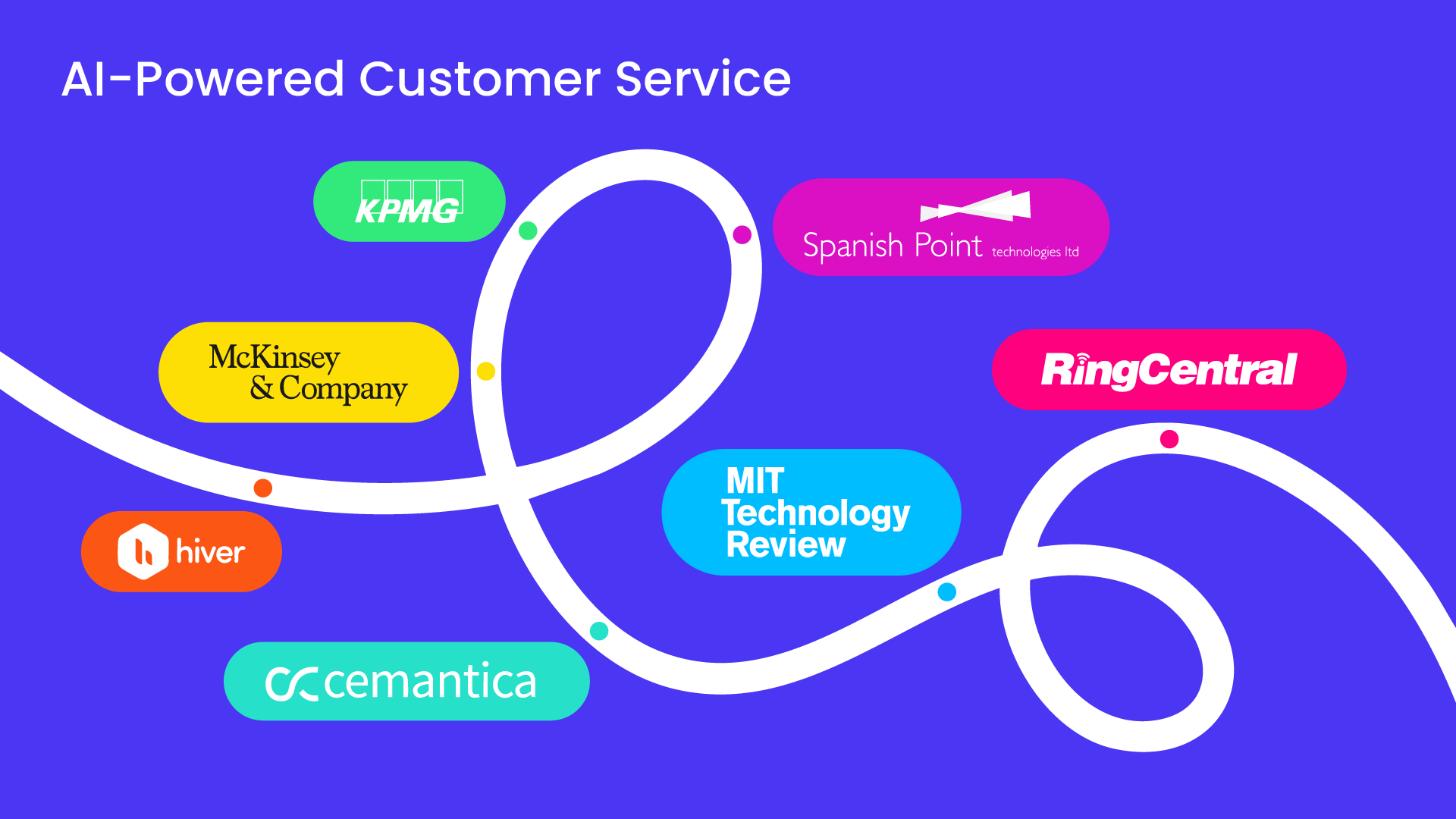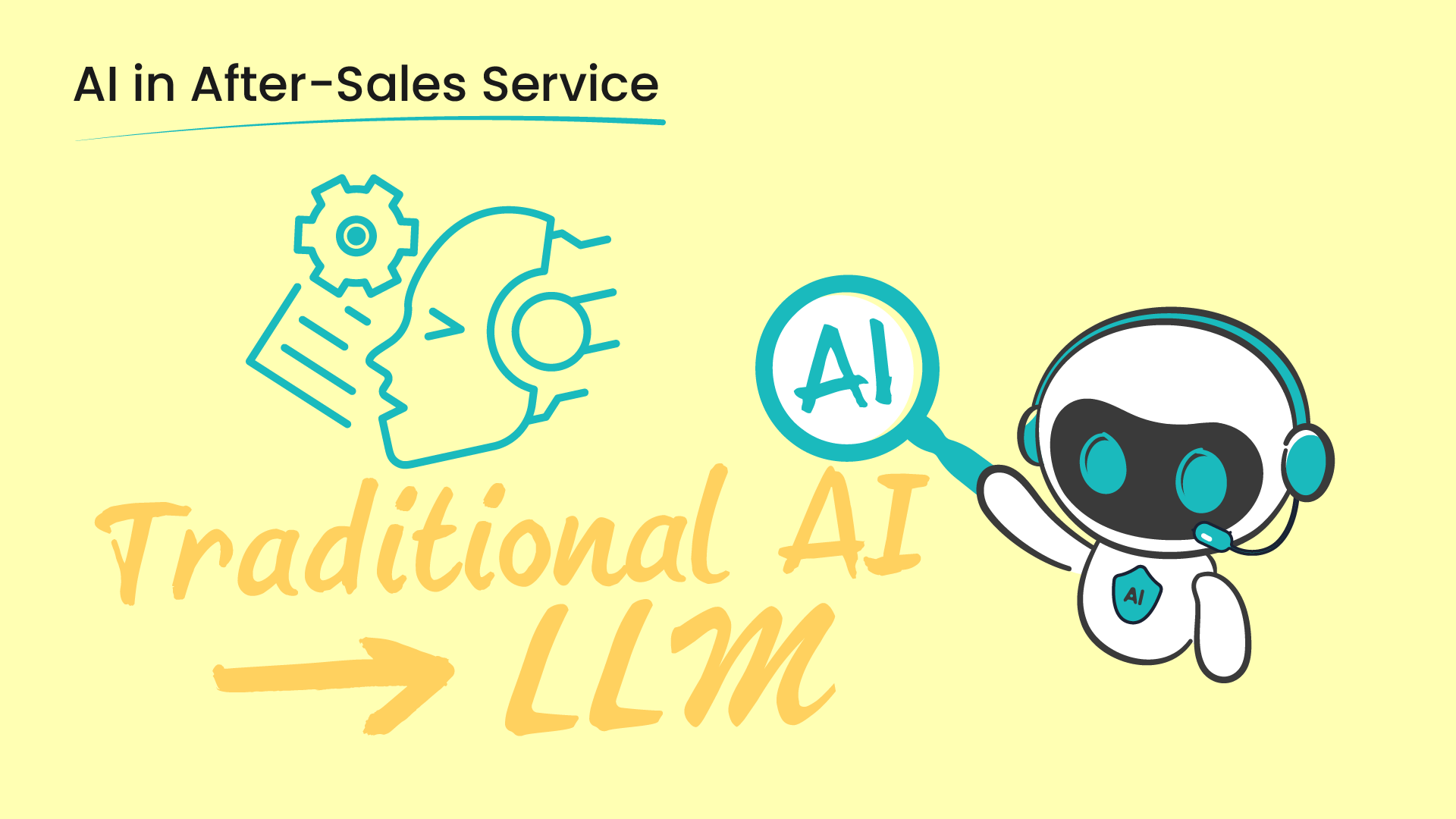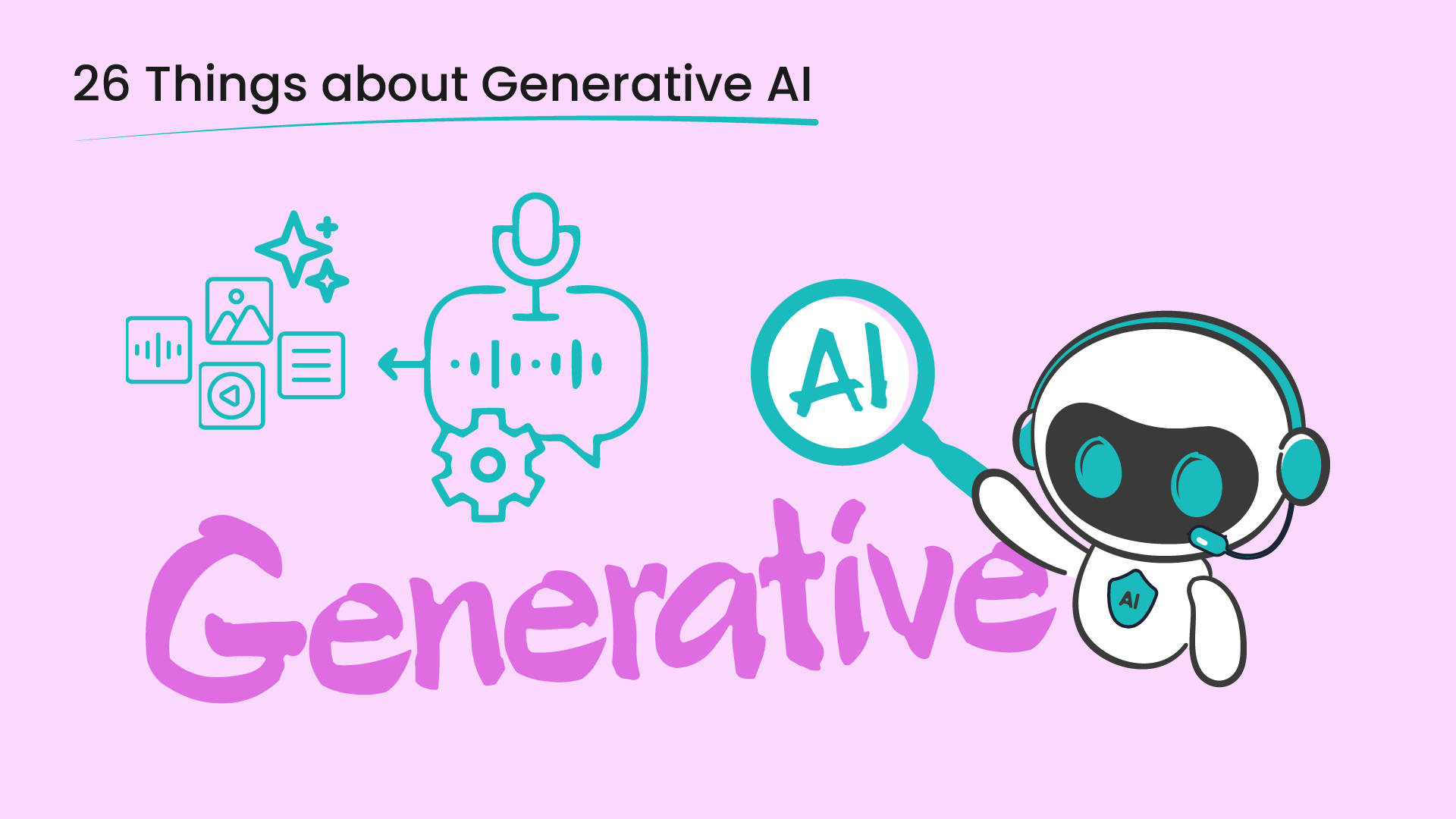The rapid evolution of technology has transformed the way businesses interact with their customers. At the heart of this transformation is artificial intelligence (AI), a driving force in reshaping customer service. From chatbots to predictive analytics, AI enhances the speed, efficiency, and personalization of customer interactions.
AI in customer service refers to the application of artificial intelligence technologies, such as machine learning, natural language processing (NLP), and automation, to improve customer interactions and streamline operations.
The importance of AI in customer service cannot be overstated. As customer expectations evolve, businesses are increasingly turning to AI solutions to meet demands for faster, more personalized service. Research indicates that 81% of customers expect quicker responses, while 73% desire better personalization. Source.
Report 1: “The Next Frontier of Customer Engagement: AI-Enabled Customer Service” by McKinsey & Company
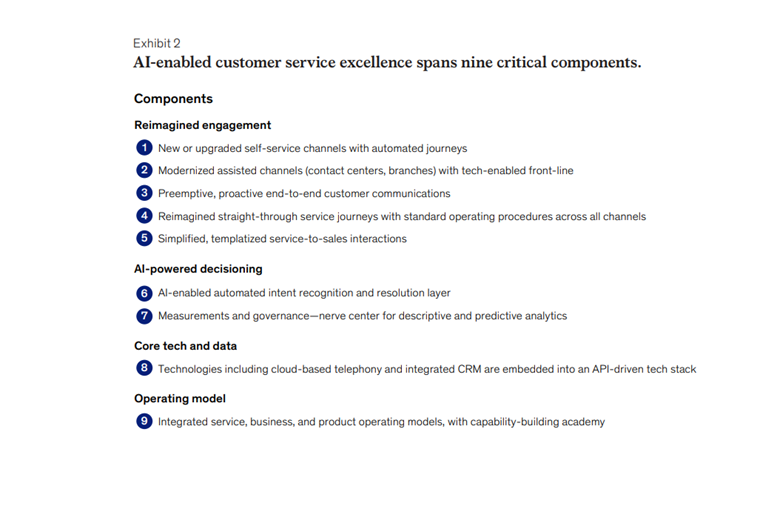
The McKinsey & Company report titled “The Next Frontier of Customer Engagement: AI-Enabled Customer Service” explores the transformative potential of artificial intelligence (AI) in enhancing customer service experiences. Here are the main insights from the report:
Key Findings
- Personalized Interactions: AI technologies enable businesses to tailor their services to individual customer needs, enhancing engagement and satisfaction.
- Proactive Strategies: By utilizing data analytics, companies can anticipate customer inquiries and address them proactively, leading to improved service efficiency and reduced costs.
- Integration with Other Technologies: The report highlights the importance of integrating AI with other technologies such as cloud computing, natural language processing (NLP), and IoT to create a seamless customer experience.
- Operational Efficiency: Implementing AI in customer service streamlines processes, reduces costs, and allows human agents to focus on complex tasks, enhancing overall productivity.
- Scalability: AI solutions can efficiently manage increasing customer interactions across various channels, ensuring consistent service quality during peak times.
Exhibit: The Stages of an AI-Supported Customer-Service Process
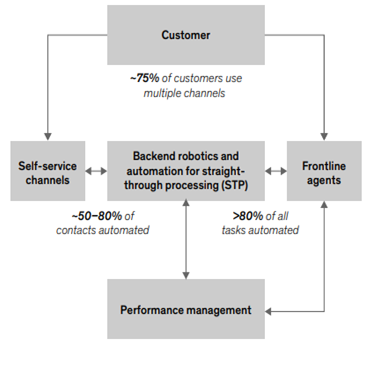
This diagram outlines the future model for customer service, showcasing how AI can enhance various touchpoints in the customer journey.
- Proactive Communication: The system anticipates customer needs based on historical data.
- Omnichannel Enablement: Customers can interact through various channels, including digital self-service and agent-supported options.
- Performance Management: Continuous evaluation of service effectiveness is facilitated through AI analytics.
We believe the proactive and personalized approach in the report represents a crucial evolution in how businesses engage with customers. By integrating AI with technologies like IoT and machine learning, companies can better anticipate customer needs and provide tailored solutions in real time.
Report 2: “Beyond the Noise: Orchestrating AI-Driven Customer Excellence” by KPMG

The KPMG report, “Beyond the Noise: Orchestrating AI-Driven Customer Excellence,” delves into how organizations can effectively harness artificial intelligence (AI) to enhance customer experiences. It emphasizes the importance of aligning AI initiatives with organizational goals and customer-centric values, while addressing ethical considerations such as fairness, privacy, and transparency.
Key Insights
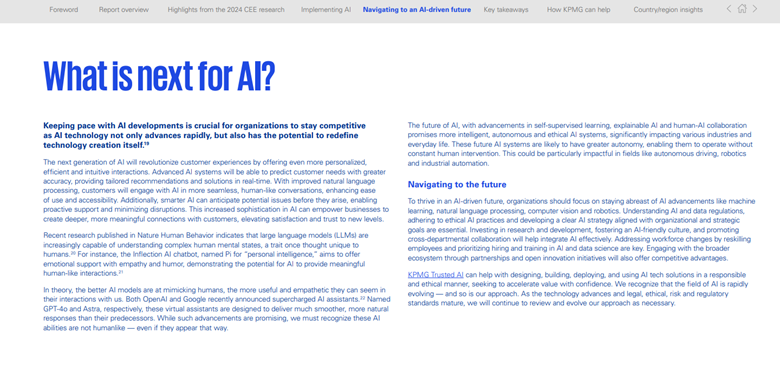
- Strategic AI Implementation:Organizations must align their people, processes, and technology to maximize AI benefits. Collaboration between IT and business units is essential for successful AI integration.
- Tangible Value Realization: Companies are focusing on achieving measurable returns on investment (ROI) from AI initiatives, moving beyond mere implementation to addressing specific operational challenges. A recent analysis indicates that companies see an average return of $3.50 for every dollar invested in AI, with some achieving as high as $8.00.
- Ethical AI Practices: Implementing robust frameworks to ensure transparency, fairness, and accountability in AI systems is crucial. Addressing ethical implications builds trust and supports sustainable AI integration.
- Humanizing AI Interactions:. Organizations are enhancing AI interfaces to be more engaging and relatable, contributing to improved customer satisfaction.
- Sector-Specific Applications:
- Airlines: Emirates uses AI chatbots for customer inquiries.
- Banking: First Direct employs AI for personalized services and fraud detection.
- Retail: Companies like HEB utilize AI for demand forecasting.
- Healthcare: The Mayo Clinic applies AI for diagnostics and patient care improvements.
In the section, What is next for AI?, It notes that the next generation of AI is set to transform customer interactions by providing highly personalized, efficient, and intuitive experiences..The report highlights that large language models (LLMs) are becoming better at understanding human emotions, enabling more meaningful interactions. For example, the Inflection AI chatbot named Pi aims to provide empathetic support.
Report 3: Customer Experience and the Future of Work by MIT Technology
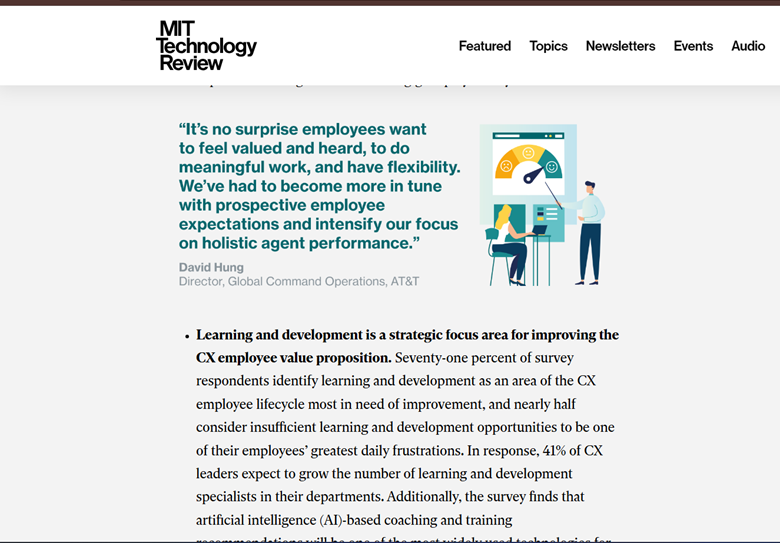
The MIT Technology Review article titled “Customer Experience and the Future of Work” examines how organizations are reassessing their customer experience (CX) strategies and workforce dynamics in response to evolving customer expectations and technological advancements.
Key Insights
- Integration of AI and Automation:
Businesses are increasingly adopting artificial intelligence (AI) and automation to enhance CX, streamline operations, and reduce costs. AI-driven tools, such as chatbots and virtual assistants, handle routine customer inquiries, allowing human agents to focus on complex issues.
- Employee Empowerment and Training:
As AI takes over repetitive tasks, there is a growing emphasis on upskilling employees to manage advanced responsibilities.Continuous training programs are essential to equip the workforce with the necessary skills to collaborate effectively with AI technologies.
- Remote and Hybrid Work Models:
The shift towards remote and hybrid work environments has prompted companies to rethink their CX strategies to ensure consistent service quality across various channels.
- Data-Driven Decision Making:
The utilization of data analytics enables organizations to gain deeper insights into customer behaviors and preferences, informing more effective CX strategies.
- Balancing Technology and Human Touch:
While technology enhances efficiency, maintaining a human touch in customer interactions remains crucial for building trust and loyalty.
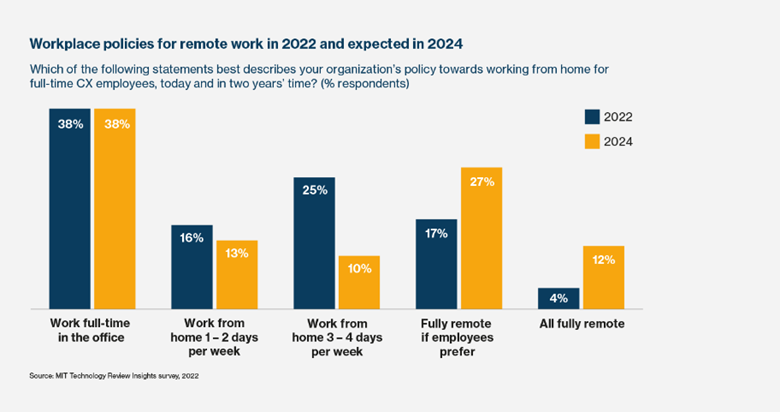
The graph from the MIT Technology Review highlights shifts in workplace policies for full-time CX employees between 2022 and 2024. While 38% of organizations maintain full-time in-office work as a constant, there is a notable increase in flexibility, with fully remote options growing from 4% in 2022 to 12% in 2024. Similarly, policies allowing employees to work remotely if preferred are projected to rise from 17% to 27%.
This reflects a broader trend toward accommodating employee preferences and adapting to hybrid work models.
Report 4:”AI’s Transformative Impact on Customer Service and Experience” by Aeries Technology4
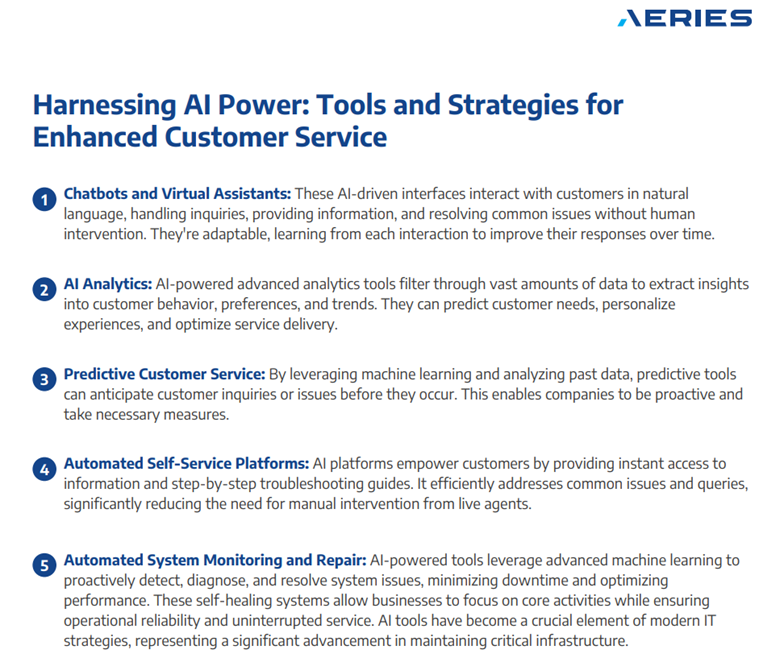
The report begins by highlighting AI’s unmatched ability to understand, anticipate, and address customer needs in real-time. This capability allows businesses to deliver personalized and efficient solutions, significantly improving operational efficiency and customer satisfaction.
Key Insights
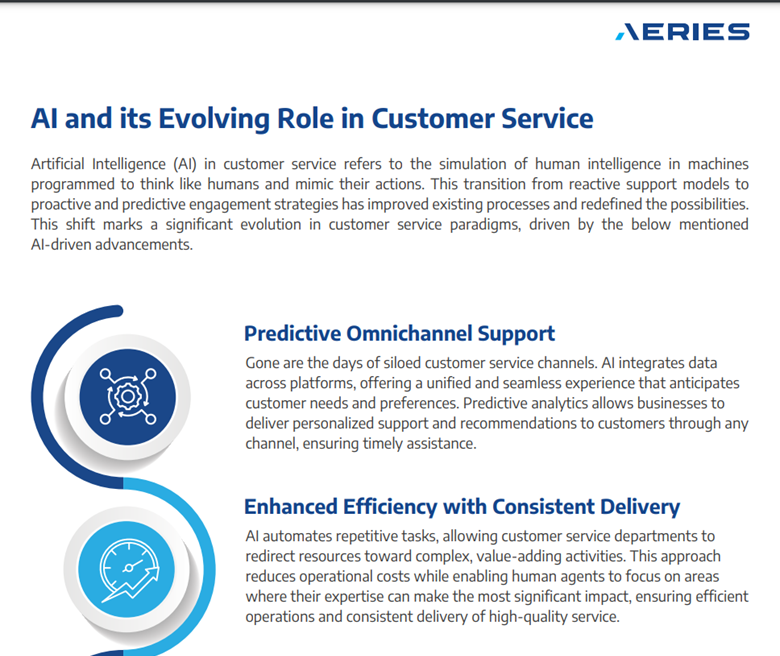
- Predictive Omnichannel Support:
AI integrates data across various platforms, enabling a seamless customer experience. Predictive analytics allow businesses to offer personalized support and recommendations, ensuring timely assistance through any channel.
- Enhanced Efficiency:
AI automates repetitive tasks, allowing customer service teams to focus on complex issues. This not only reduces operational costs but also ensures high-quality service delivery, as AI can handle multiple inquiries simultaneously.
- Personalized Customer Experience:
By analyzing customer data, AI delivers tailored recommendations and services, making interactions more relevant and engaging. This personalization fosters increased customer loyalty and satisfaction.
- Multilingual Assistance:
AI breaks down language barriers through real-time translation services, making customer support accessible to a diverse global audience.
- Proactive Problem Solving:
AI tools can predict potential issues before they arise, allowing businesses to take proactive measures. For example, they can notify customers about upcoming expirations or renewals, preventing service disruptions.
- Scalability:
AI solutions can dynamically adjust to fluctuating demand, maintaining high service quality during peak times without needing additional human resources.
The report describes how describes how a prominent healthcare company with over 10,000 employees improved its IT service desk operations by implementing AI technologies. This included chatbot-assisted automation for immediate responses, automated ticket management, and advanced reporting tools. As a result of these solutions, the company achieved a 40% reduction in ticket resolution time, a 30% increase in reporting efficiency, a 25% decrease in recurring issues, and a 30% boost in user satisfaction.
Report 5 : AI in CX Whitepaper by Cemantica
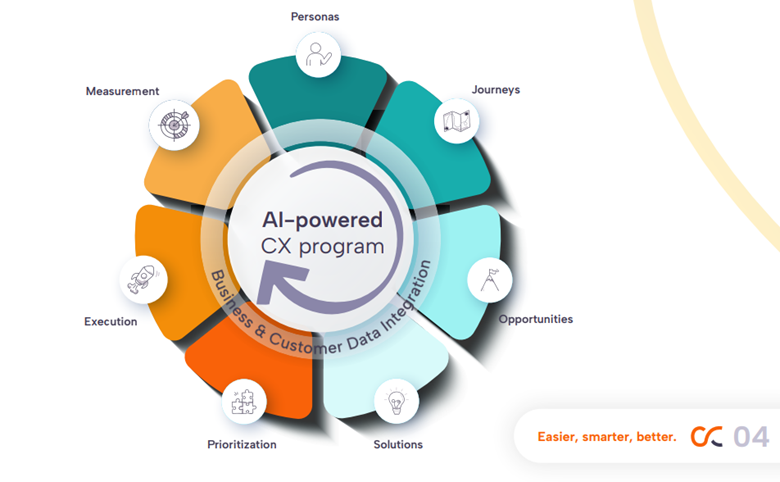
The “AI in CX Whitepaper” by Cemantica explores how artificial intelligence (AI) can significantly enhance customer experience (CX) management. The report emphasizes the need for organizations to adapt to evolving customer demands and leverage AI to streamline processes, improve personalization, and gain insights into customer behavior.
Key Insights

- AI’s Role in Customer Experience
The whitepaper outlines various ways AI can support CX management, including creating and enriching customer personas, mapping customer journeys, identifying pain points, and suggesting actionable solutions.
- Creating Personas with AI
AI assists in developing detailed customer personas by analyzing existing data from CRM systems and other sources. This enables CX teams to create accurate representations of their target audience quickly, which is crucial for tailoring marketing strategies and improving customer interactions.
- Journey Mapping
The report highlights the importance of journey mapping in understanding customer experiences. AI can automate the creation of journey maps by extracting relevant data from various touchpoints, thus providing a comprehensive view of customer interactions with the brand.
- Identifying Opportunities and Solutions
AI analyzes customer feedback from multiple channels to identify recurring issues and suggests improvements. This proactive approach helps organizations address pain points effectively, enhancing overall customer satisfaction.
- Prioritizing CX Projects
With numerous opportunities for improvement identified, AI can assist in prioritizing projects based on factors such as potential impact, cost, and resource availability. This ensures that CX teams focus on initiatives that will deliver the greatest benefits.
- Measuring Impact
The report emphasizes the need for continuous measurement of CX initiatives’ impact on business performance. AI tools can simulate financial scenarios based on improvements in customer experience metrics, helping organizations make informed investment decisions.
Report 6: AI vs Human: The Future of Customer Service in 2024 by Hiver
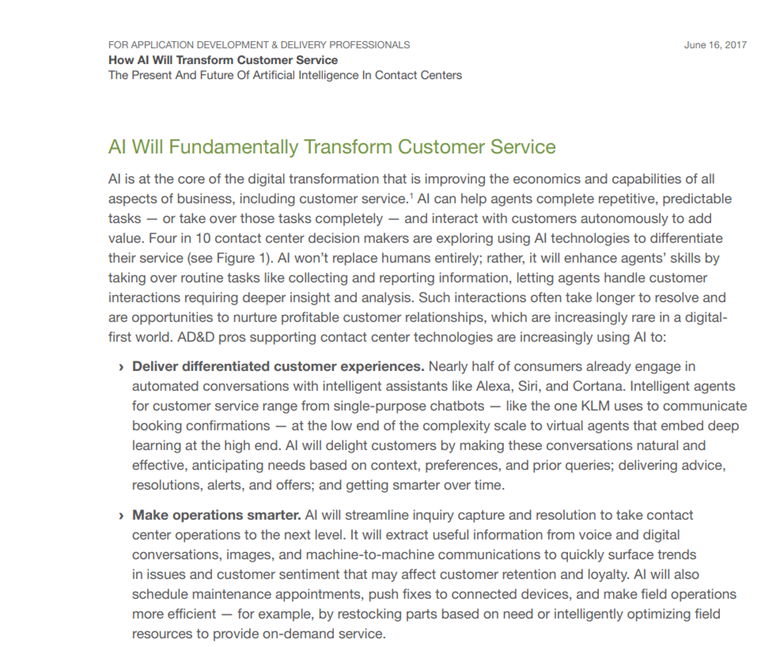
The report “AI vs Human: The Future of Customer Service in 2024” by Hiver explores the evolving landscape of customer service, focusing on the roles of artificial intelligence (AI) and human agents.
It presents findings from a survey of over 500 customer service professionals, highlighting the balance between AI efficiency and the human touch in delivering exceptional customer experiences.
Key Insights
- Investment in AI:
Approximately 43% of organizations are investing in AI for customer support, recognizing its ability to handle multiple tasks efficiently and provide 24/7 service. However, 57% of professionals are unaware of these investments, indicating a need for better communication within organizations.
- Preference for Human-First Strategy:
59% of support professionals advocate for a human-led approach, valuing the empathy and personalized service that human agents offer, especially for complex issues that require emotional intelligence and creative problem-solving.
- Benefits of AI Tools:
60% of customer support experts acknowledge the advantages of AI, such as automating routine tasks and predictive capabilities. This allows human agents to focus on more complex inquiries.
- Customer Preferences:
The survey revealed that 52% of customers prefer human interaction due to its empathetic nature, while 42% appreciate a combination of AI and human support, suggesting a balanced approach is favored.
Report 7: How AI Will Transform Customer Service by Spanish Point Technologies
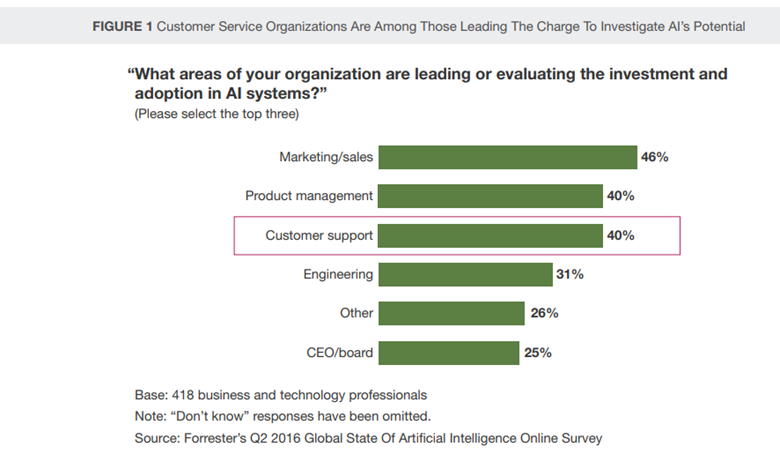
The report “How AI Will Transform Customer Service” by Spanish Point Technologies discusses the significant impact of artificial intelligence (AI) on customer service operations. Here’s a concise summary of the key points covered in the report:
Key Insights
- Automation of Tasks:
AI technologies, such as chatbots and virtual assistants, automate routine customer interactions, allowing human agents to focus on complex inquiries. This leads to increased efficiency and faster response times.
- Enhanced Customer Experience:
By leveraging AI, organizations can provide personalized experiences tailored to individual customer preferences. AI analyzes customer data to predict needs and deliver relevant solutions proactively.
- Data-Driven Insights:
AI can analyze vast amounts of data to identify trends and insights that help businesses understand customer behavior better. This data-driven approach enables more informed decision-making and strategy development.
- Cost Efficiency:
Implementing AI in customer service can lead to significant cost savings by reducing the need for extensive human resources for routine tasks and minimizing operational inefficiencies.
- Human-AI Collaboration:
The report emphasizes the importance of collaboration between AI systems and human agents. While AI can handle straightforward queries, human agents are essential for providing empathy and addressing complex customer needs.
Report 8: An Introduction to AI in Customer Service by RingCentral
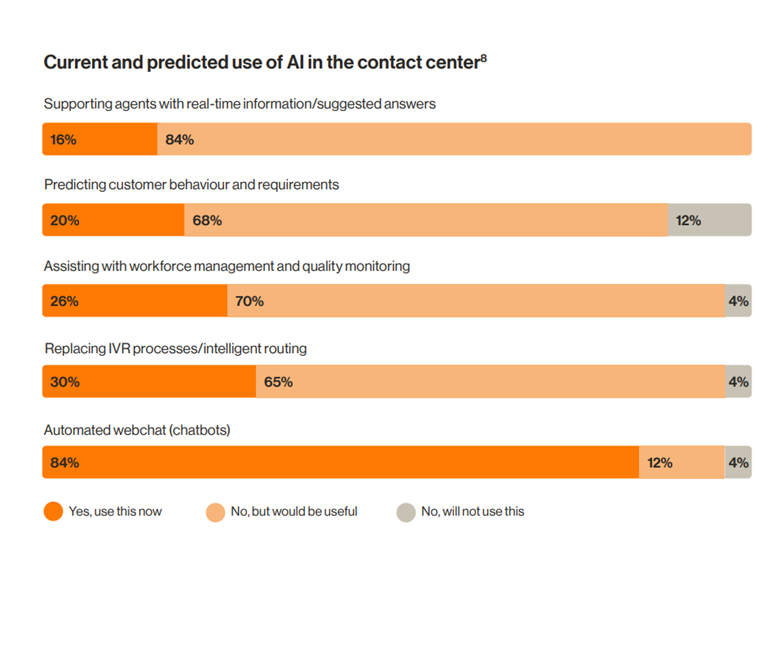
It highlights the rapid adoption of AI technologies, particularly accelerated by the global pandemic, and outlines both the benefits and challenges associated with integrating AI into customer service strategies.
Key Insights
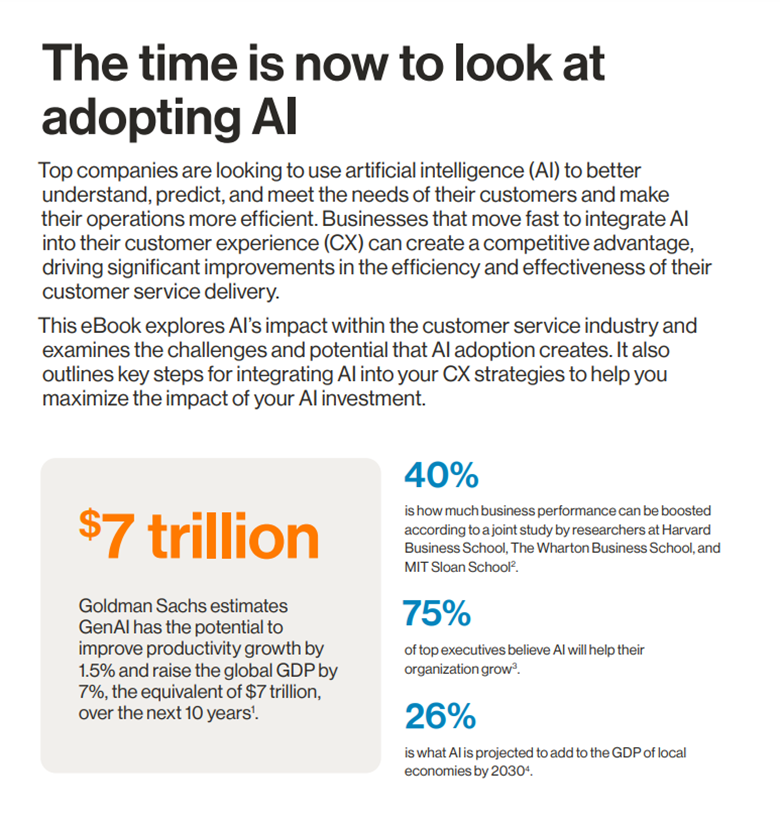
- AI Adoption Trends:
The report notes a significant rise in AI adoption within the customer service sector, with many organizations facilitating over 95% of their service interactions via AI or digital channels.
- Impact on Customer Satisfaction:
Organizations using AI report significant improvements in customer satisfaction metrics, including a 48% increase in CSAT scores and a 38% decrease in hold times.
- Challenges of AI Integration:
Common misconceptions persist about AI being impersonal or threatening jobs. The report emphasizes that AI should be viewed as a tool to enhance human capabilities rather than replace them.
- Strategies for Successful Integration:
The report outlines key steps for integrating AI into customer service, including aligning with business goals, ensuring organizational readiness, starting with small-scale implementations, and continuously measuring success through key performance indicators (KPIs).
- Future Outlook:
The report concludes that adopting AI in customer service is no longer optional; it is essential for meeting modern customer expectations for speed, convenience, and personalization. Companies that integrate AI effectively can achieve significant cost savings and improved operational efficiencies.
Wrap Up
In conclusion, the integration of artificial intelligence (AI) in customer service is fundamentally transforming the way businesses interact with their customers. The ability of AI to automate routine inquiries allows human agents to focus on more complex issues, leading to faster resolution times and a more effective service experience. The future of customer service lies in this harmonious integration of technology and empathy, ensuring that customers receive not only efficient solutions but also personalized care.

